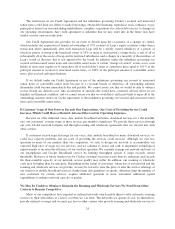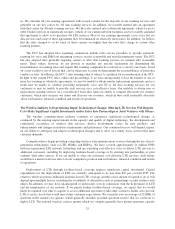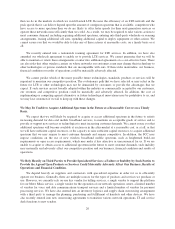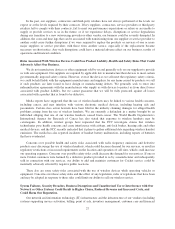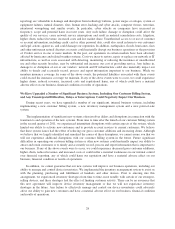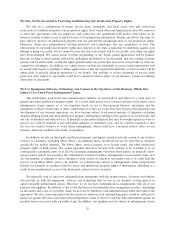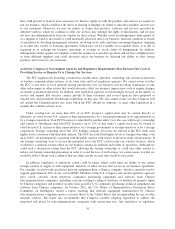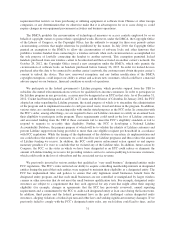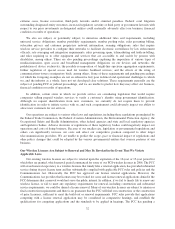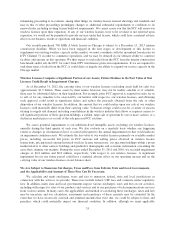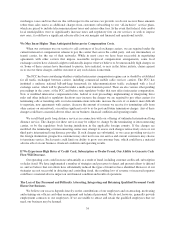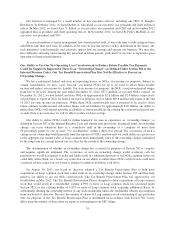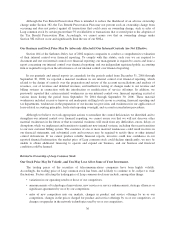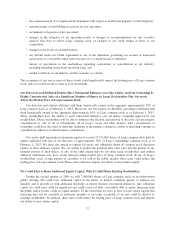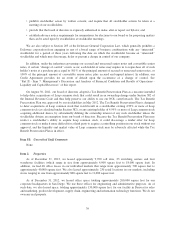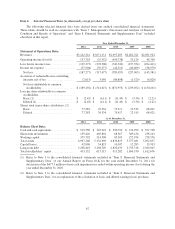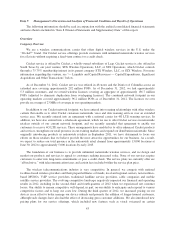Cricket Wireless 2012 Annual Report Download - page 48
Download and view the complete annual report
Please find page 48 of the 2012 Cricket Wireless annual report below. You can navigate through the pages in the report by either clicking on the pages listed below, or by using the keyword search tool below to find specific information within the annual report.surcharges, taxes and fees that are due with respect to the services we provide, we do not recover these amounts
(other than sales taxes) as additional charges from customers subscribing to our “all-inclusive” service plans,
which are priced to include telecommunications taxes and certain other fees. In the event that federal, state and/or
local municipalities were to significantly increase taxes and regulatory fees on our services or seek to impose
new ones, it could have a significant adverse effect on our margins and financial and operational results.
We May Incur Higher Than Anticipated Intercarrier Compensation Costs.
When our customers use our service to call customers of local exchange carriers, we are required under the
current intercarrier compensation scheme to pay the carrier that serves the called party, and any intermediary or
transit carrier, for the use of their networks. While in most cases we have been successful in negotiating
agreements with other carriers that impose reasonable reciprocal compensation arrangements, some local
exchange carriers have claimed a right to unilaterally impose what we believe to be unreasonably high charges on
us. Some of these carriers have threatened to pursue, have initiated, or may in the future initiate, claims against
us to recover these charges, and the outcome of any such claims is uncertain.
The FCC has been considering whether a unified intercarrier compensation regime can or should be established
for all traffic exchanged between carriers, including commercial mobile radio services carriers. The FCC has
instituted a uniform, national bill-and-keep framework for telecommunications traffic exchanged with a local
exchange carrier, which will be phased in under a multi-year transition period. There are also various other pending
proceedings in the courts, at the FCC and before state regulatory bodies that may affect intercarrier compensation.
New or modified intercarrier compensation rules, federal or state proceedings implementing or interpreting those
rules and other judicial or regulatory decisions may increase the charges we are required to pay other carriers for
terminating calls or transiting calls over telecommunications networks, increase the costs of, or make it more difficult
to negotiate, new agreements with carriers, decrease the amount of revenue we receive for terminating calls from
other carriers on our network, or result in significant costs to us for past and future termination charges. Any of these
changes could have a material adverse effect on our business, financial condition and operating results.
We resell third party long distance services in connection with our offering of unlimited international long
distance service. The charges for these services may be subject to change by the terminating or interconnecting
carrier, or by the regulatory body having jurisdiction in the applicable foreign country. If the charges are
modified, the terminating or interconnecting carrier may attempt to assess such charges retroactively on us or our
third party international long distance provider. If such charges are substantial, or we cease providing service to
the foreign destination, prospective customers may elect not to use our service and current customers may choose
to terminate service. Such events could limit our ability to grow our customer base, which could have a material
adverse effect on our business, financial condition and operating results.
If We Experience High Rates of Credit Card, Subscription or Dealer Fraud, Our Ability to Generate Cash
Flow Will Decrease.
Our operating costs could increase substantially as a result of fraud, including customer credit card, subscription
or dealer fraud. We have implemented a number of strategies and processes to detect and prevent efforts to defraud
us, and we believe that our efforts have substantially reduced the types of fraud we have identified. However, if our
strategies are not successful in detecting and controlling fraud, the resulting loss of revenue or increased expenses
could have a material adverse impact on our financial condition and results of operations.
The Loss of Key Personnel and Difficulty Attracting, Integrating and Retaining Qualified Personnel Could
Harm Our Business.
We believe our success depends heavily on the contributions of our employees and on attracting, motivating
and retaining our officers and other management and technical personnel. We do not, however, generally provide
employment contracts to our employees. If we are unable to attract and retain the qualified employees that we
need, our business may be harmed.
34


